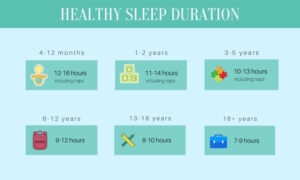blog
blog | 02.11.20
How Long Should You Be Sleeping?
From the time we’re young and well into our adult lives, we often hear the question, “Are you getting enough sleep?” While it might not be the first thing that comes to mind when you think of “healthy living,” sleep plays a significant role in a person’s overall well-being at every stage of life.
According to the National Institutes of Health, inadequate amounts of restful sleep can lead to a long list of problems, including:
- Higher rates of obesity, high blood pressure, heart disease, stroke, certain cancers, and diabetes
- Higher rates of depression and anxiety
- Poor mood, energy and motivation
- Decreased focus, memory, and decision-making abilities
- Lower immune function
While children tend to have strict bedtimes to help regulate their sleep schedule, the idea of getting “enough sleep” may seem like a far-fetched luxury to some adults. No matter our age, though, it’s important to be mindful of sleep quality and duration; the effects of a good night’s sleep are more far-reaching than you might think! When considering how many hours of sleep you should be getting each night, there are a few factors to keep in mind:
Age: As demonstrated in the graphic below, age plays a large role in how much sleep is required. Newborns require the most sleep, since their brains and bodily functions are still developing.
Gender: A study conducted by neuroscientist, Jim Horne, suggests that women require an additional 20 minutes of sleep per night than men. While the study conducted is based on a relatively small sample size (210 participants), it concludes that women disproportionately suffer from poor sleep – 18% compared to 8% of men – and could benefit from a few extra Z’s.
Lifestyle: If you’re having trouble meeting your sleep quota for the night, try mixing up your daily routine. The National Sleep Foundation recommends combating insomnia by getting regular exercise, setting routine bed and wake times, limiting caffeine and alcohol intake, and improving the sleep environment.


